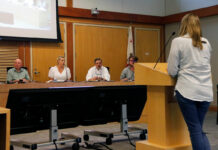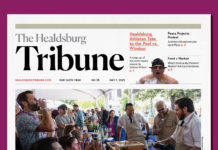Most of us are still adjusting to Daylight Saving Time, trying to get our biological clocks re-set to early morning darkness and droopy eyelids. All this to save an hour of evening sunlight? We can think of better things worth saving.
For instance, instead of Daylight Saving we think there should be more Sunshine Saving. That’s not about changing time clocks; it’s about shining more light on our government meetings and public records.
We hate being such a pest about this, but it is our job as newspaper journalists to let our readers know we need all the help we can get to watchdog all the local government bodies that spend our tax dollars and make important decisions for us. Keeping the doors to government open to all and putting elected officials “on the record” is every citizen’s business. Secrets and closed door meetings are anti-sunshine and we need to enforce and expand the laws that make them illegal.
Try as we might, the forces of anti-sunshine and closed-door government meetings keep trumping our right to know. This is true at all levels of government, from a local school board budget meeting to a U.S. Congress hearing about Hillary Clinton’s emails or an international nuclear arms treaty with Iran.
Too few citizens attend government meetings and fewer bother to ask important questions or demand access to the public record.
A small newspaper staff can’t do the job for a whole community or for everyone who pays taxes. Every month, there are dozens of local school board, city council, fire district and other government meetings. Even a paid journalist can’t attend all of them. At each of these meetings, actions are taken to spend tax dollars. Testimony and votes about zoning permits, land use, new laws and adjudicated lawsuits are held. Public minutes are recorded but offer very little information. These minutes are written with an ink pen that favors darkness and not sunshine.
This is National Sunshine Week (March 15-21.) It is celebrated each year at newspapers and elsewhere to support open government practices and public records laws. The dates coincide with the birthday of James Madison, the chief author of our nation’s Bill of Rights.
“Knowledge will forever govern ignorance; and a people who mean to be their own governors must arm themselves with the power which knowledge gives,” said Madison over 200 years ago.
Sad to say, there has never been more ignorance among the citizens of our republic than there exists today. Too many think that Madison’s words are a lofty ideal and not meant to be applied to today’s problems of closed-door government and lack of public record reporting.
We can think of not one local government body that is not guilty of shielding parts of its business from public view or easy access. We may elect honest and well-meaning men and women to public office but that doesn’t mean the best of them doesn’t hold secret conversations and escape behind the false comfort of closed doors to do public business.
We see evidence of this “government in the shadows” all over the place. But without more help from active citizens we are almost helpless to pour sunshine and transparency over the offenders.
That doesn’t mean we won’t keep trying. We will. Most of the time, a local elected official or public agency has nothing to hide. Maybe they’re just a little loose or lazy with the public meeting and records requirements. But that is not acceptable.
We endorse the idea of more shining more sunshine on government. We will continue to investigate any suspected breech of this principle that is brought to our attention.
The public has a right to know, even as some may sometimes find that inconvenient.
— Rollie Atkinson








